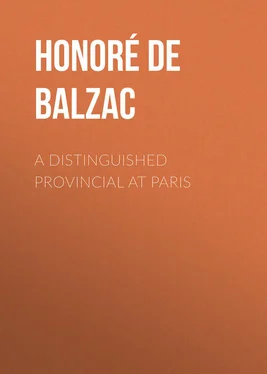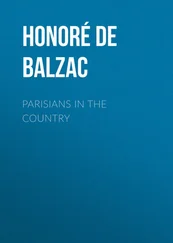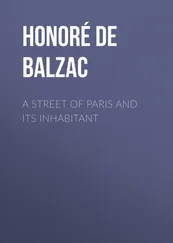Honoré Balzac - A Distinguished Provincial at Paris
Здесь есть возможность читать онлайн «Honoré Balzac - A Distinguished Provincial at Paris» — ознакомительный отрывок электронной книги совершенно бесплатно, а после прочтения отрывка купить полную версию. В некоторых случаях можно слушать аудио, скачать через торрент в формате fb2 и присутствует краткое содержание. Жанр: literature_19, foreign_antique, foreign_prose, на английском языке. Описание произведения, (предисловие) а так же отзывы посетителей доступны на портале библиотеки ЛибКат.
- Название:A Distinguished Provincial at Paris
- Автор:
- Жанр:
- Год:неизвестен
- ISBN:нет данных
- Рейтинг книги:4 / 5. Голосов: 1
-
Избранное:Добавить в избранное
- Отзывы:
-
Ваша оценка:
- 80
- 1
- 2
- 3
- 4
- 5
A Distinguished Provincial at Paris: краткое содержание, описание и аннотация
Предлагаем к чтению аннотацию, описание, краткое содержание или предисловие (зависит от того, что написал сам автор книги «A Distinguished Provincial at Paris»). Если вы не нашли необходимую информацию о книге — напишите в комментариях, мы постараемся отыскать её.
A Distinguished Provincial at Paris — читать онлайн ознакомительный отрывок
Ниже представлен текст книги, разбитый по страницам. Система сохранения места последней прочитанной страницы, позволяет с удобством читать онлайн бесплатно книгу «A Distinguished Provincial at Paris», без необходимости каждый раз заново искать на чём Вы остановились. Поставьте закладку, и сможете в любой момент перейти на страницу, на которой закончили чтение.
Интервал:
Закладка:
“How do M. and Mme. de Rastignac manage to keep their son in Paris, when, as we know, their income is under a thousand crowns?” asked Lucien, in his astonishment at Rastignac’s elegant and expensive dress.
“It is easy to see that you come from Angouleme,” said Mme. d’Espard, ironically enough, as she continued to gaze through her opera-glass.
Her remark was lost upon Lucien; the all-absorbing spectacle of the boxes prevented him from thinking of anything else. He guessed that he himself was an object of no small curiosity. Louise, on the other hand, was exceedingly mortified by the evident slight esteem in which the Marquise held Lucien’s beauty.
“He cannot be so handsome as I thought him,” she said to herself; and between “not so handsome” and “not so clever as I thought him” there was but one step.
The curtain fell. Chatelet was now paying a visit to the Duchesse de Carigliano in an adjourning box; Mme. de Bargeton acknowledged his bow by a slight inclination of the head. Nothing escapes a woman of the world; Chatelet’s air of distinction was not lost upon Mme. d’Espard. Just at that moment four personages, four Parisian celebrities, came into the box, one after another.
The most striking feature of the first comer, M. de Marsay, famous for the passions which he had inspired, was his girlish beauty; but its softness and effeminacy were counteracted by the expression of his eyes, unflinching, steady, untamed, and hard as a tiger’s. He was loved and he was feared. Lucien was no less handsome; but Lucien’s expression was so gentle, his blue eyes so limpid, that he scarcely seemed to possess the strength and the power which attract women so strongly. Nothing, moreover, so far had brought out the poet’s merits; while de Marsay, with his flow of spirits, his confidence in his power to please, and appropriate style of dress, eclipsed every rival by his presence. Judge, therefore, the kind of figure that Lucien, stiff, starched, unbending in clothes as new and unfamiliar as his surroundings, was likely to cut in de Marsay’s vicinity. De Marsay with his wit and charm of manner was privileged to be insolent. From Mme. d’Espard’s reception of this personage his importance was at once evident to Mme. de Bargeton.
The second comer was a Vandenesse, the cause of the scandal in which Lady Dudley was concerned. Felix de Vandenesse, amiable, intellectual, and modest, had none of the characteristics on which de Marsay prided himself, and owed his success to diametrically opposed qualities. He had been warmly recommended to Mme. d’Espard by her cousin Mme. de Mortsauf.
The third was General de Montriveau, the author of the Duchesse de Langeais’ ruin.
The fourth, M. de Canalis, one of the most famous poets of the day, and as yet a newly risen celebrity, was prouder of his birth than of his genius, and dangled in Mme. d’Espard’s train by way of concealing his love for the Duchesse de Chaulieu. In spite of his graces and the affectation that spoiled them, it was easy to discern the vast, lurking ambitions that plunged him at a later day into the storms of political life. A face that might be called insignificantly pretty and caressing manners thinly disguised the man’s deeply-rooted egoism and habit of continually calculating the chances of a career which at that time looked problematical enough; though his choice of Mme. de Chaulieu (a woman past forty) made interest for him at Court, and brought him the applause of the Faubourg Saint-Germain and the gibes of the Liberal party, who dubbed him “the poet of the sacristy.”
Mme. de Bargeton, with these remarkable figures before her, no longer wondered at the slight esteem in which the Marquise held Lucien’s good looks. And when conversation began, when intellects so keen, so subtle, were revealed in two-edged words with more meaning and depth in them than Anais de Bargeton heard in a month of talk at Angouleme; and, most of all, when Canalis uttered a sonorous phrase, summing up a materialistic epoch, and gilding it with poetry – then Anais felt all the truth of Chatelet’s dictum of the previous evening. Lucien was nothing to her now. Every one cruelly ignored the unlucky stranger; he was so much like a foreigner listening to an unknown language, that the Marquise d’Espard took pity upon him. She turned to Canalis.
“Permit me to introduce M. de Rubempre,” she said. “You rank too high in the world of letters not to welcome a debutant . M. de Rubempre is from Angouleme, and will need your influence, no doubt, with the powers that bring genius to light. So far, he has no enemies to help him to success by their attacks upon him. Is there enough originality in the idea of obtaining for him by friendship all that hatred has done for you to tempt you to make the experiment?”
The four newcomers all looked at Lucien while the Marquise was speaking. De Marsay, only a couple of paces away, put up an eyeglass and looked from Lucien to Mme. de Bargeton, and then again at Lucien, coupling them with some mocking thought, cruelly mortifying to both. He scrutinized them as if they had been a pair of strange animals, and then he smiled. The smile was like a stab to the distinguished provincial. Felix de Vandenesse assumed a charitable air. Montriveau looked Lucien through and through.
“Madame,” M. de Canalis answered with a bow, “I will obey you, in spite of the selfish instinct which prompts us to show a rival no favor; but you have accustomed us to miracles.”
“Very well, do me the pleasure of dining with me on Monday with M. de Rubempre, and you can talk of matters literary at your ease. I will try to enlist some of the tyrants of the world of letters and the great people who protect them, the author of Ourika , and one or two young poets with sound views.”
“Mme. la Marquise,” said de Marsay, “if you give your support to this gentleman for his intellect, I will support him for his good looks. I will give him advice which will put him in a fair way to be the luckiest dandy in Paris. After that, he may be a poet – if he has a mind.”
Mme. de Bargeton thanked her cousin by a grateful glance.
“I did not know that you were jealous of intellect,” Montriveau said, turning to de Marsay; “good fortune is the death of a poet.”
“Is that why your lordship is thinking of marriage?” inquired the dandy, addressing Canalis, and watching Mme. d’Espard to see if the words went home.
Canalis shrugged his shoulders, and Mme. d’Espard, Mme. de Chaulieu’s niece, began to laugh. Lucien in his new clothes felt as if he were an Egyptian statue in its narrow sheath; he was ashamed that he had nothing to say for himself all this while. At length he turned to the Marquise.
“After all your kindness, madame, I am pledged to make no failures,” he said in those soft tones of his.
Chatelet came in as he spoke; he had seen Montriveau, and by hook or crook snatched at the chance of a good introduction to the Marquise d’Espard through one of the kings of Paris. He bowed to Mme. de Bargeton, and begged Mme. d’Espard to pardon him for the liberty he took in invading her box; he had been separated so long from his traveling companion! Montriveau and Chatelet met for the first time since they parted in the desert.
“To part in the desert, and meet again in the opera-house!” said Lucien.
“Quite a theatrical meeting!” said Canalis.
Montriveau introduced the Baron du Chatelet to the Marquise, and the Marquise received Her Royal Highness’ ex-secretary the more graciously because she had seen that he had been very well received in three boxes already. Mme. de Serizy knew none but unexceptionable people, and moreover he was Montriveau’s traveling companion. So potent was this last credential, that Mme. de Bargeton saw from the manner of the group that they accepted Chatelet as one of themselves without demur. Chatelet’s sultan’s airs in Angouleme were suddenly explained.
Читать дальшеИнтервал:
Закладка:
Похожие книги на «A Distinguished Provincial at Paris»
Представляем Вашему вниманию похожие книги на «A Distinguished Provincial at Paris» списком для выбора. Мы отобрали схожую по названию и смыслу литературу в надежде предоставить читателям больше вариантов отыскать новые, интересные, ещё непрочитанные произведения.
Обсуждение, отзывы о книге «A Distinguished Provincial at Paris» и просто собственные мнения читателей. Оставьте ваши комментарии, напишите, что Вы думаете о произведении, его смысле или главных героях. Укажите что конкретно понравилось, а что нет, и почему Вы так считаете.












